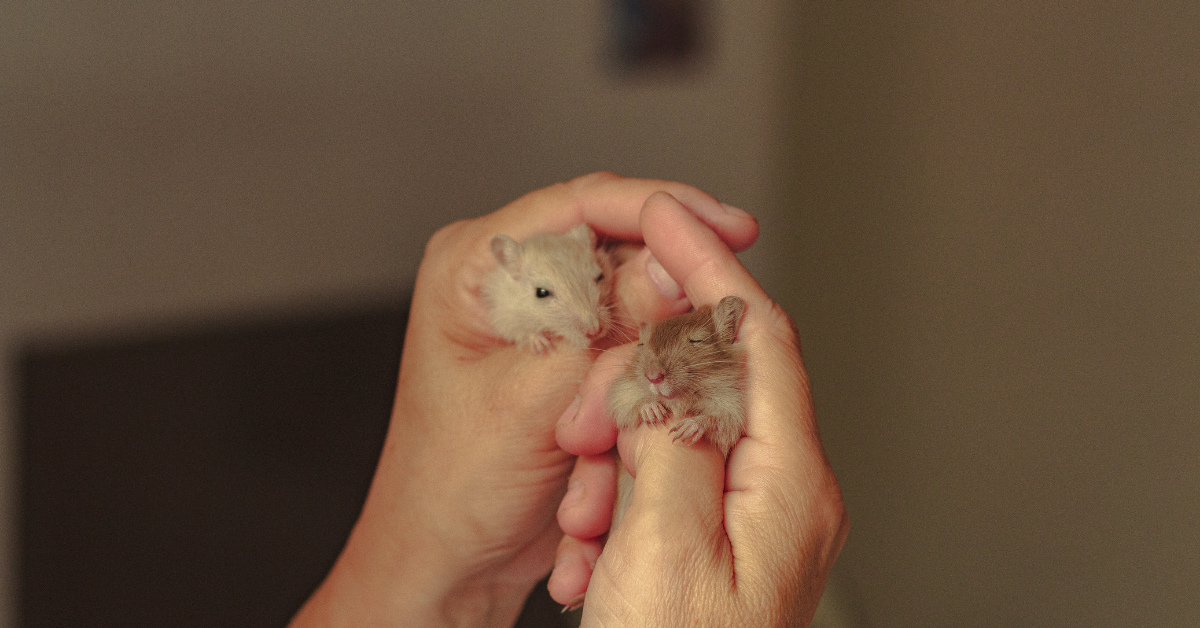
What Small Animal is Right for You?
For some people who would like to have a pet, a dog or cat is not a good option. Maybe they live in a small space, they have allergies, they want a pet that doesn’t require quite as much care, or they want something a little different. Following are some suggestions for small pets to consider.
Hamsters, gerbils and rats
These types of pets are great for people living in small spaces. They require no vaccines and very little vet care. They are inexpensive to keep. Keep in mind that hamsters are mostly nocturnal (active at night), whereas gerbils and rats are mostly diurnal (active during the day). Also, hamsters may bite while gerbils and rats rarely bite, especially if handled regularly. Rats are smart and friendly. They can develop a strong bond with their owner.
Unfortunately, the typical lifespan of these types of pets is only two-four years. All rodents love to chew so they must be kept in an enclosure they cannot chew through. Provide chew sticks for them to gnaw on regularly. This is necessary to keep their teeth worn down. They should also be provided with toys and a wheel for exercise. Use a wheel that they won’t get their tail caught in.
Guinea pigs
Guinea pigs are another popular choice of pet in the rodent family. You can let them out to run around (supervised, of course) without having to worry too much about them getting lost in your house or apartment. Of all the smaller rodents, they tend to have a longer lifespan, typically five-seven years, although they may live as long as ten years.
Many people enjoy the whistling noises that they make, but they can get quite loud if they are upset. Guinea pigs are social animals, so if you are considering them as a pet you should get a same-sex pair. Females are best, as males may fight. Guinea pigs require a larger cage than smaller rodents. They also need access to chew sticks and toys. Since guinea pigs cannot produce their own vitamin C, it is extremely important to buy a food specifically formulated for them. It will provide them with the right amount of vitamin C. Many times, your local shelter will have guinea pigs available for adoption.
Rabbits
Rabbits require a little more care than other rodent-type pets and are a longer commitment, as the average lifespan is ten years. They may also require more veterinary care. They become bored easily therefore daily exercise is required. Rabbits love to chew and if allowed to be loose in the house will chew on everything. They can do quite a bit of damage, so it is important to supervise them if they are out in the house. Be sure to keep electrical cords out of reach. Given the right amount of attention, rabbits can be very friendly and make great pets.
Ferrets
If you can deal with the musky smell of a ferret, they make wonderful, entertaining pets. Unfortunately, in a couple of US states (New York and California) as well as a few municipalities around the country, ferrets remain illegal. They are very social animals and will often pair up. So you should definitely plan on getting at least two ferrets if you are considering them as a pet. They require a bi-annual veterinary exam and a yearly canine distemper vaccine, so be sure there is a vet in your area that treats ferrets. It is extremely important that ferrets be spayed or neutered before reaching sexual maturity. They can be descented at the same time. This will not only reduce their odor (although it never completely goes away), it will also prevent serious health issues later and curb any aggressive behaviors. Unspayed female ferrets are extremely susceptible to aplastic anemia, which is deadly.
Ferrets are very entertaining pets. Owners love watching their crazy antics. They are very curious and therefore should not be left to roam your home unsupervised. They should have a large cage to stay in when you are not home. Check with your local humane society for adoptable ferrets, or check for a ferret rescue group in your area.
Reptiles
Many people choose to keep reptiles as pets because they are clean, quiet, take up little space and can be interesting to watch. Some reptiles require very specialized care, so be sure to research the specific type of reptile you are considering to know exactly what they require. Most reptiles need to be fed live food; anything from mealworms and crickets to mice or rats. If this makes you queasy, a reptile is probably not the right pet for you.
Birds
Birds can be pleasant pets to have and they are very inexpensive to keep, as they require very little veterinary care. Finches and canaries have very pleasant songs. Finches are very social birds and should be kept in groups. Parakeets and cockatiels may be noisy, especially if not given enough attention. They can be trained to sit on your finger or shoulder, allowing you to create a bond with them. Be sure you get the right kind of cage for your bird. Finches require a longer cage because they fly more horizontally. Canaries, parakeets and cockatiels require a taller cage because they fly vertically. Of course, the bigger the cage you are able to provide, the better.
No matter what small pet you are considering, do some research before making a final decision. Once you decide on the type of pet to get, check with your local animal shelter or rescue group for adoptable pets.
For more information on small pet adoption, visit the ASPCA (http://www.aspca.org/pet-care/small-pet-care/). For information on exotic birds, visit the Exotic Bird Rescue (http://www.avianrescue.org/index.html). For information on reptiles and amphibians, visit the Smithsonian National Museum of Natural History (http://vertebrates.si.edu/herps/herps_reptilesaspets.htm) or PetFinder (http://www.petfinder.com/before-pet-adoption/reptiles-as-pets.html).






